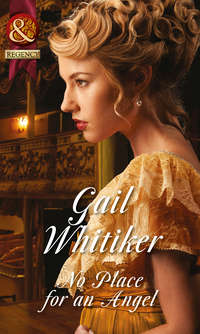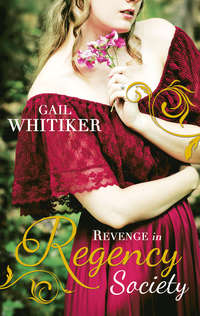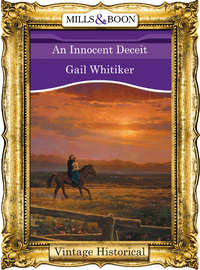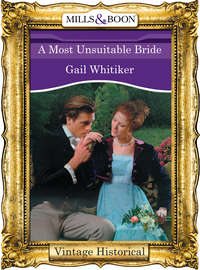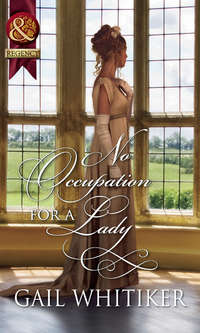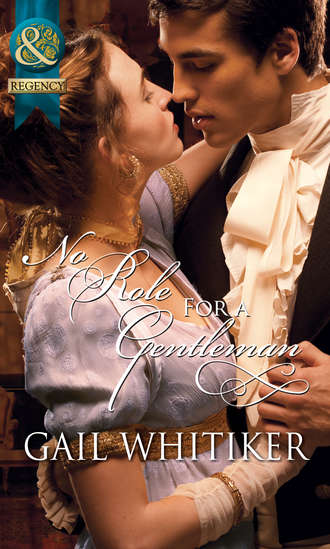
Полная версия
No Role For A Gentleman
Ironic, really, that her aunt, who had once been so openly disapproving of every aspect of William’s life, should now be heard to say that she was doing all she could to help her poor brother and niece cope with the unexpected changes thrust upon them.
‘Speaking of convenient,’ Lady Cynthia said, ‘did you find whatever it was you were looking for?’
‘It was a book and, no, I did not,’ Joanna said, surprised her aunt would even remember that her niece had gone out for reasons other than to see to her own errands. ‘But I happened upon a gentleman who offered to lend me his copy.’
‘How thoughtful.’ Lady Cynthia gazed up at Joanna over the rim of her spectacles. ‘I take it you were acquainted with the gentleman?’
‘No, but he knew Papa,’ Joanna said, stretching the truth a little. ‘He will be coming to the lecture tomorrow evening.’
Her aunt’s expression was blank. ‘Lecture?’
‘Yes. The one Papa is giving at the Apollo Club. I did tell you about it,’ Joanna said. ‘Just as I told you that I would be in attendance as well, given that many of my drawings will be on display.’
Her aunt’s reaction was exactly what Joanna had been expecting. She took off her glasses and said with a sigh of frustration, ‘Joanna, I really cannot understand why you and your father persist in this ridiculous occupation. He is the Earl of Bonnington now and with that comes an obligation to his name and his position in society. Both of which are far more important than sitting around with a bunch of stodgy old men talking about Egypt.’
‘I understand your concern, Aunt,’ Joanna said as patiently as she could. ‘But you must understand that up until now, archaeology and the study of ancient Egypt have been the focus of my father’s life.’
‘Of course, because his position in the family made it necessary that he find something to do with his time,’ Lady Cynthia said, ‘though why he could not have gone into the church or purchased a commission is beyond me. Either of those occupations would have been far more suitable. However, with both Hubert and Trevor gone, your father is now the earl and he must accept the responsibilities inherent with the title. That includes seeing to your welfare and he must know that your chances of making a good match will not be improved by his conduct,’ Lady Cynthia said, the expression on her face leaving Joanna in no doubt as to her displeasure. ‘Circumstances demand that you marry well, and your bluestocking tendencies and your father’s willingness to encourage them will not improve your chances.’
‘I doubt it will be my conduct or my father’s that will have a negative impact on my eligibility, Aunt,’ Joanna was stung into replying. ‘I suspect much of society knows that Papa is heavily in debt as a result of his brother’s and nephew’s recklessness and if you would find fault with anyone, it seems to me it should be with those who are truly to blame for the predicament in which we now find ourselves!’
It was a sad but true commentary on the state of their affairs. Joanna’s late uncle had gambled away a large part of the family’s fortune, and his son had squandered the rest on women and horses. Both had met with dramatic ends: her uncle from a fall off a cliff in a drunken stupor, and her cousin from a gunshot wound sustained during a duel with the angry husband of the woman with whom he had been having an affair.
The sad result was that, while Joanna’s father had inherited a lofty title, there was precious little to go along with it. Bonnington Manor, a once-beautiful Elizabethan house, had been left to moulder in the English countryside, its stone walls overgrown with vegetation, its lush gardens choked with weeds. Even the town house in London was in desperate need of refurbishment. While both residences had come with a handful of loyal retainers, the list of unpaid bills that accompanied them was enough to make a king blush.
Little wonder her father had not embraced his elevation to the peerage, Joanna reflected wryly. By necessity, one of his first duties was to find a way of raising enough money to carry out the extensive repairs required—and she was not so naïve as to believe that she did not play a role in that solution.
‘Well, no matter what the state of your father’s affairs, I do not intend to let you sit like a wallflower in a garden of roses,’ Lady Cynthia said. ‘You are a fine-looking girl. With luck, we will be able to attract a gentleman of means and to secure an offer of marriage, which we both know is your father’s only hope of salvaging the estate given his own stubborn refusal to marry again. Speaking of which, I hope you have not forgotten that we are going out this evening?’
Joanna had, but given her aunt’s decidedly prickly mood, decided it would be wiser not to let on. ‘No, of course not.’
‘Good, because while I do not particularly care for Mrs Blough-Upton, it is important that you be seen as often as possible now that you are out of mourning. You will be one and twenty on your next birthday and I do not intend to allow this obsession with Egypt to ruin your chances for making a good marriage.’
Sensing there was nothing to be gained by continuing the conversation, Joanna bid her aunt a polite good morning and then went upstairs to her room. She was well aware that her aunt’s only concern was to find her niece a rich husband. And that she could not understand why anyone would be so passionate about a country that was dirty, poverty stricken and populated by the most inhospitable people imaginable.
Joanna thought the opinion a trifle unfair given that her aunt had never set foot in the country, but neither could she entirely find fault with the assessment. Egypt was dirty and poverty stricken and populated by some very questionable types—but there was so much to see and discover that the one negated the other. Tremendous finds had been made in the last few decades. Travellers were flocking to the banks of the Nile to see the wonders being discovered there, while explorers following in the footsteps of James Bruce and Giovanni Belzoni were setting out to uncover the tombs of long-dead kings, hoping to find in those burial chambers a cache of precious metals and jewels. And, more importantly, clues to deciphering the mysteries of the past.
Joanna sincerely hoped her father would find such a tomb one day and that she would be at his side when he did. Together, they would see sights no English man or woman ever had and perhaps be able to write another chapter in the history of the world.
It was hard to believe anyone wouldn’t view such a marvellous trip as the opportunity of a lifetime.
Mr Laurence Bretton certainly had. His candid statements and earnest manner had left Joanna in no doubt as to his desire to visit Egypt and, despite the impropriety of his conduct, she was not sorry he had come up to her in the shop. Though he reminded her of one of her father’s students with his wire-rimmed spectacles, rumpled jacket and studious air, he was clearly an educated man. Intelligent, well spoken and dedicated to uncovering the mysteries of a bygone age, he was a far cry from the dandies and fops who were more concerned with the cut of their coats than with the secrets of the past. She was looking forward to seeing him again for that reason alone.
The fact he had the most astonishing blue eyes and one of the most attractive smiles she had ever seen really had nothing at all to do with it.
At half past nine that evening, Laurence stood in his dressing room as his valet ran a brush over the back and shoulders of his perfectly fitted black velvet coat. Though the cut of the habit à la française was at least a decade out of date, it was perfectly in keeping with the role he would be playing tonight. That of Valentine Lawe, the wildly successful playwright, whose most recent work, A Lady’s Choice, was once again playing to packed houses at the elegant Gryphon Theatre.
‘Laurence, are you almost ready to go?’ his sister enquired from the doorway. ‘If we do not leave soon we are going to be late and that would be shockingly bad mannered given that you are the guest of honour.’
‘I am not the guest of honour, Tory,’ Laurence said, surveying the froth of lace at his throat with a critical eye. It was a touch more flamboyant than usual, but, given the nature of the event, he doubted it would go amiss. Lydia and her friends did so love a touch of the dramatic. ‘I am but one of the many guests Lydia will have invited and, in such a crowd, I doubt she will even notice what time we arrive.’
‘Oh, she’ll notice,’ Victoria said with a feline smile. ‘The widow is over the moon at being able to tell her friends that the famous playwright, Valentine Lawe, will be at her gathering this evening. She is but another of your many conquests, my dear, and I do believe she is hoping for an opportunity to further the acquaintance, if you know what I mean.’
Laurence frowned, all too aware of what his sister meant and none too pleased by the implication. ‘Thank you, but I have absolutely no intention of becoming the latest in a long line of Lydia’s discarded lovers, nor a potential candidate for her third husband. She may be one of the wealthiest widows in town, but having spent more time in her company than I like, I understand why people say what they do about her.’ He cast a last look at his appearance and then nodded his satisfaction. ‘Thank you, Edwards. As usual, you have done an excellent job of turning me out in a manner suitable to the occasion.’
‘My pleasure, Mr Bretton.’
As the valet bowed and withdrew, Victoria picked up the boutonnière resting on the dressing table and drew out the pin. ‘Are you sure you want me to come with you tonight, dearest? You really don’t need me at your side any more. Lord knows, you’ve attended enough gatherings in the guise of Valentine Lawe to be able to carry it off without any assistance from me.’
‘Be that as it may, I like having you there,’ Laurence said, watching his sister pin the velvety-red rose close to his collar. ‘You are a refreshing breath of reality in the midst of all this madness.’
‘Madness you invited upon yourself,’ Victoria murmured, stepping back to survey her handiwork. ‘You were the one who volunteered to step into the role of Valentine Lawe. Before that, he existed only in my mind, the nom de plume behind which I wrote my plays.’
‘Exactly. Valentine Lawe is your creation so it is only right that you be there to hear the compliments being showered upon his … or rather, your plays,’ Laurence said. ‘Besides, what else have you to do this evening? I happen to know that your husband is otherwise engaged.’
‘Yes, but don’t forget that I am helping his cousin Isabelle plan her wedding, as well as picking out furnishings for the orphanage, and all while endeavouring to write a new play. I have more than enough to do and not nearly enough time in which to do it.’
‘Nonsense. Your mother-in-law is overseeing most of the arrangements for Isabelle’s wedding,’ Laurence said, ‘and your husband has more than enough servants to attend to the requirements of his new orphanage. As for the play, I have every confidence in you penning yet another masterpiece that will garner the same high level of praise as your last four. Besides, you know you will have a much better time if you come with me.’
‘I’m not so sure about that,’ Victoria said. ‘Lydia Blough-Upton has never been one of my favourite people. She is an outrageous flirt, an insatiable gossip and she continues to make her feelings for you embarrassingly obvious. Still, I suppose I do owe you a few more favours. Your stepping forwards to assume the role of Valentine Lawe has certainly allowed my life to return to normal, though given what it’s done to yours, I do wonder if it wouldn’t have been easier just to admit that I wrote the plays and see how it all turned out.’
‘In some ways, I suspect it would,’ Laurence said, removing his spectacles and placing them on the dressing table. He only needed them for reading and, given that they did nothing for the image he was trying to convey, he felt no grief at leaving them behind. ‘No doubt you and Winifred would have been shunned by good society for a time and our family would have been ignored by those who felt it wasn’t the thing for the daughter of a gentleman to write plays that mocked society and the church.’
‘I do not mock the church,’ Victoria said defensively. ‘Only those who draw their livings from it and you cannot deny there is more than enough room for ridicule in that. As to society, I suspect the furore would have eventually died down, replaced by an even more scandalous bit of gossip about someone placed far higher up the social ladder than me. But when I see how much happier Mama and Winifred are with you in the role of Valentine Lawe than me, I have to believe you did the right thing, Laurie. Even if you did fail to give it the consideration it deserved.’
‘I gave it no consideration whatsoever.’
‘Exactly, and taking that into account, I think it has all turned out very well. Besides, only think how disappointed the young ladies would be if they were to find out that you are not the dashing and very eligible playwright they have all come to know and admire.’
‘I doubt it would trouble them overly much,’ Laurence said, thinking not for the first time of the lovely and erudite Miss Joanna Northrup, a lady he tended to believe would be far more impressed with his intellectual abilities than his literary ones. ‘They are infatuated with the image, not with the man.’
‘I’m not so sure,’ Victoria said. ‘Even I have seen the changes in you since you assumed the role of Valentine Lawe. You are far more confident than you were in the past and, while you have always been charming, there is an added refinement to your manner now that is highly engaging. No doubt Lydia Blough-Upton would like to have you all to herself tonight so she can flirt with you unobserved by your staid and newly married sister.’
‘My darling girl,’ Laurence said, tucking Victoria’s arm in his, ‘you will never be staid and it is quite impossible for me to do anything unobserved now that the world believes me to be Valentine Lawe. Anonymity is a thing of the past. I am now and for ever will be the public face of your creative genius.’
‘Then let us go forth and face the world together,’ Victoria said, sweeping her fan off the bed. ‘All of London awaits your entrance and none more so than the ever-growing and increasingly ardent fans of the illustrious Valentine Lawe!’
Chapter Two
As Lady Cynthia had predicted, Mrs Blough-Upton’s soirée was a breath-stealing crush that Joanna was ready to leave well before the clock chimed the midnight hour. She had forgotten how stifling these affairs could be and how pompous was much of English society. Several well-dressed couples cast curious glances in her direction, and though she was paid flattering compliments by many of the gentlemen to whom she was introduced, a few of the young ladies were not as kind.
‘I suppose it is only to be expected that you would come back with imperfections of the skin,’ Miss Blenkinsop said, peering with disdain at the offending freckles sprinkled across the bridge of Joanna’s nose. ‘After all, the sun is so very harsh in India.’
‘Egypt.’
‘I beg your pardon?’
‘My father and I were in Egypt,’ Joanna said as patiently as she could. ‘Not India.’
‘Ah. But the two countries are quite close, are they not?’
‘Do you not wear a hat when you are out during the day, Lady Joanna?’ Miss Farkington enquired.
‘Of course, but with the sun being so strong, it is sometimes difficult to—’
‘I would die if I were ever to discover a blemish on my skin,’ Miss Blenkinsop interrupted dramatically. ‘It is the reason I spent most of last summer in the drawing room.’
‘Indeed, Mama insists on rubbing my skin with lemon juice whenever I have been outside,’ Miss Farkington informed them. ‘She said an ounce of prevention is worth a pound of cure and that if I wish to go about in the sun, I should wait until after I am married to do so. And preferably until after I have presented my husband with his first heir.’
Having no idea how to respond to such a silly remark, Joanna said nothing, convinced it was the wisest course of action. She had long since come to the conclusion that she had absolutely nothing in common with the Misses Blenkinsop and Farkington, who subscribed to the popular belief that young women should do nothing that might detract from their eligibility as wives. They were like hothouse flowers: best viewed from a distance and preferably in the rarefied atmosphere of a drawing room.
Then, a collective sigh echoed around the room as Lydia Blough-Upton walked in on the arm of a gentleman who looked to be considerably younger than her and not in the least concerned about it. He was dressed formally in black-and-white evening attire, though the cut of the jacket and the heavy use of embroidery were clearly reminiscent of a bygone age. His waistcoat, blindingly white and intricately embroidered with silver thread, had been cut by a master’s hand. The smoothness of his satin pantaloons and silk stockings outlined muscular calves and thighs that, given the rest of his build, owed nothing to the effects of padding.
That he looked like an aristocrat was evident to every person in the room. His rich brown hair was styled in a classic crop and his eyes, blue as lapis lazuli, gazed out from a face more handsome than any gentleman’s in the room. But Joanna had seen those eyes before. Though they had been partially hidden behind wire-rimmed spectacles, the intensity of the colour had struck her forcibly at the time, as had the sincerity of his smile and the earnest nature of his conversation.
A conversation that had given her absolutely no reason to believe that Mr Laurence Bretton was anything but the humble student of history he had so convincingly purported to be.
‘Isn’t he divine?’ gushed Miss Farkington. ‘I wish he would write something for me.’
‘Write?’ Joanna’s head snapped around as an unhappy memory of a youthful infatuation came back to haunt her. ‘Never tell me he’s a poet?’
‘Dear me, no, he’s a playwright. Surely you’ve heard of Valentine Lawe?’
‘Actually, no.’
‘How strange.’ Miss Farkington blinked. ‘His latest play is all the rage. But then you have been in mourning for quite some time.’
‘Mama and I have been to see it twice,’ Miss Blenkinsop said with a condescending air. ‘You really should go now that you are moving in society again, Lady Joanna. It is all anyone can talk about, as is Mr Bretton himself. Is he not the most dashing of gentleman?’
Joanna stared at the man who was making such an impact on the ladies in the room and wondered why he had made no mention to her of his literary accomplishments when they had met earlier in the day. All he’d said then was that he was a devoted student of ancient Egypt—which was obviously not true since his appearance on Mrs Blough-Upton’s arm now in clothes that would have put a dandy to shame proclaimed him for the Pink of Fashion he so evidently was.
‘Ah, there you are, Joanna,’ Lady Cynthia said, pushing her way through the crowd to appear at her niece’s side. ‘Mr Albert Rowe, eldest son of Lord Rowe and heir to a considerable fortune, is interested in making your acquaintance. I told him I would bring you to him at once.’
‘Aunt, that gentleman on Mrs Blough-Upton’s arm,’ Joanna said, ignoring her aunt’s petition, ‘do you know him?’
Lady Cynthia turned her head in the direction of their hostess and her eyes widened. ‘Well, well, so he did come. I’d heard that he had been invited, but no one knew whether or not he would attend. Lydia is so very forward and she has made no secret of her affection for him.’
‘Then you do know him?’
‘Of course I know him, Joanna. Everyone knows Laurence Bretton, or rather, Valentine Lawe as he is better known to theatre-going audiences. His latest play opened at the Gryphon Theatre last season and has been brought back for this one. I know you’re not all that fond of theatre, but you really should go. Everyone is talking about the play and Mr Bretton is himself garnering a great deal of attention. I understand he has been invited to dine with one of the royal dukes.’
Joanna turned back to watch the gentleman who had somehow managed to disengage himself from Mrs Blough-Upton’s talons and now stood chatting to three young ladies who giggled a great deal and seemed to hang on every word he said. So, he was not the erudite student of archaeology he had led her to believe. He was a successful playwright who, judging by the reactions of the Misses Farkington and Blenkinsop, wrote the kind of romantic drivel so popular with society today—weakly plotted stories about star-crossed lovers, most often portrayed by simpering young women who could cry on cue and impossibly handsome men who could not act.
It was a sobering discovery.
Still, at least now she knew the truth about him. Whatever his true purpose in coming up to her in the bookshop this afternoon, it obviously hadn’t had anything to do with his professed love of ancient Egypt. No doubt he’d known exactly who she was, even though he had pretended not to, and his offer to lend her a book had been nothing more than a calculated attempt to engage her in conversation without going to the trouble of securing a proper introduction; something she would never have countenanced had she known beforehand exactly who and what he was.
And then, the unexpected. Mr Bretton, breaking off his conversation with the prettiest of the three ladies, looked up and met Joanna’s eyes across the room.
The contact was startling, the intensity of that brilliant blue gaze unnerving.
Joanna felt hot colour bloom in her cheeks and hastily looked away, but not before seeing him make his excuses to the ladies and then start in her direction.
‘Oh, good Lord, he’s coming this way,’ Lady Cynthia said.
Joanna glanced at her aunt, astonished to hear the same kind of fatuous adulation in her voice as she had in Miss Blenkinsop’s earlier. Gracious, was she the only woman in the room who was not over the moon at the prospect of talking to the man? ‘Really, Aunt, he is only a—’
‘Miss Northrup,’ Mr Bretton said, coming to a halt in front of her. ‘We meet again. And sooner than expected.’
His smile was as devastating as it had been earlier in the day, but Joanna no longer found it quite so endearing. ‘Indeed, Mr Bretton,’ she said, lifting her chin. ‘Or should I say, Mr Lawe.’
To her annoyance, he actually smiled. ‘I would prefer Mr Bretton since Valentine Lawe really doesn’t exist.’
Yet, he did tonight, Joanna reflected cynically. Standing before her in clothes more suited to the stage than a drawing room, he exuded confidence and seemed blissfully unaware of the furore he was causing in the hearts of the young—and not so young—ladies around him. Taller than she remembered, his features were more finely chiselled, likely due to the fact he had left his spectacles at home. His mouth was generous and his lips, which had no doubt whispered many a charming endearment in Mrs Blough-Upton’s ear, were firm and quite disturbingly sensual.
And he wore a single red rose pinned close to the collar of his jacket.
Joanna hardly knew what to make of him.
Neither, it seemed, did her aunt, who was staring at both of them with unconcealed delight. ‘My dear Mr Bretton, can it be that you and Lady Joanna are already acquainted?’
At that, finally, he did falter. ‘Lady Joanna?’ His dark brows drew together. ‘Forgive me. I was not aware of the distinction.’
‘Perhaps my niece did not think to mention it.’
‘No, I did not,’ Joanna said, smiling sweetly. ‘But then, it was hardly relevant to the topic of our conversation. Any more than was Mr Bretton being a famous playwright.’ She might be new to the role of earl’s daughter, but she too could play the part when called upon to do so.


